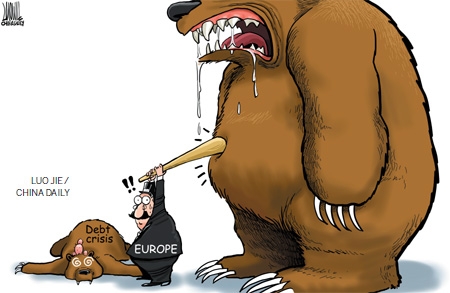Drastic actions needed to solve debt crisis
Updated: 2011-07-15 10:51
By Zhang Ming (China Daily European Weekly)
 |
One year after the outbreak of Europe's sovereign debt crisis, negative news came one after another.
On May 9, Standard & Poor's downgraded Greece's credit rating to "B". On May 16, the European Union (EU) and the International Monetary Fund (IMF) announced 78 billion euros to Portugal as emergency assistance. On June 13, Standard & Poor's further downgraded Greece's credit rating to "CCC", and would continue to maintain a negative outlook. This is the lowest sovereign credit rating Standard & Poor's gives.
The reappearance of the European sovereign debt crisis has shocked vulnerable financial markets worldwide, and oil prices and commodity prices fell accordingly.
The European debt crisis continues to escalate even after the introduction of the largest rescue package in history, worth 750 billion euros. This amount of money is enough to cover all the matured debt in 2010 and 2011 of the five countries with low credit ratings in Europe: Portugal, Italy, Ireland, Greece and Spain.
The most important reason for the financial crisis is probably because the market believes the emergency loans the EU and IMF provided is not a good way to help those countries to move forward. Loans may only postpone the crisis.
The biggest problem for the five countries is they have borrowed a lot from the financial market when their national competitiveness is declining. These countries were not able to repay their sovereign debt themselves, which resulted in the crisis.
With the emergency loans, the crisis-laden countries can only repay old debts with new debts. The loans do not bring down the scale of the total debts, but simply extend the repayment date. If the five countries do not increase their solvency, then as the new debt matures, the crisis will be revived.
For example, a dynamic condition of sustainability of government debt is that the country's future economic growth should not be lower than the government debt's interest rate. The interest rate of the 110 billion euro loan that Greece received from the EU and IMF starts at 5 percent and then is reduced to 4 percent.
But in the next few years, it might be difficult for Greece to have an economic growth rate higher than 4 percent. This means that it is extremely difficult for Greece to repay the emergency funds, not to mention the repayment of those debts borrowed at market interest rates.
To get out of the sovereign debt crisis, Greece is facing two choices. It could adopt structural adjustments to improve national economic competitiveness and make its economic growth rate higher than interest on debt to repay existing debts. Or, it could improve the reimbursable condition of current debts by lowering interest rates or by reducing the scale of debts based on restructuring.
Ideas are much easier to propose than to execute.
It is hard to reshape the competitiveness of Greece and other southern European countries. These countries are confronted with declining competitiveness of traditionally dominant industries, the lack of flexibility in the labor market and heavy pension liabilities and other issues.
In addition, membership in the eurozone has made them lose many means to stimulate economic growth, such as lowering interest rates, currency devaluation and the expansion of fiscal spending. This means that these countries may still maintain low growth in the near future.
The reason that the EU has tried to prevent the five countries from breaching the agreement and restructuring their debt is that they are concerned about the breeding of moral hazard in the eurozone countries.
As European commercial banks are cross holding a high amount of national debts of these five countries, the decline in value caused by debt restructuring will once again impact the balance sheets of commercial banks, which may not only set off a banking crisis, but the ensuing credit squeeze will impact the global economy again.
In core countries, such as Germany and France in the EU, the governments are battling with public opinion. Voters in France and Germany are reluctant to use their own resources to rescue the five countries, while voters in the five affected countries refuse government proposals of achieving fiscal stability by pension cuts and tax increases.
The debt crisis will not end soon. This battle may last three to four years or even longer, with the possibility of periodic outbreaks. If this is not addressed properly, the debt crisis could negatively impact European monetary integration and the prospect of euro.
But there are some ways out of a longer financial crisis.
The EU and IMF could announce a massive low-interest loan to Greece, about 500 billion euros with an interest rate lower than 3 to 3.5 percent.
Official creditors and private creditors could reach an agreement that would allow Greece to extend the period for debt liquidation or reducing the current debt interest rate, namely soft restructuring.
If these measures don't work, Greece could breach the contracts and come to an agreement with its creditors about direct debt reduction, or hard debt restructuring.
The resurgence of Europe's sovereign debt crisis will impact the global economy.
The global aggregate demand may continue to shrink, and there would be an increase in international trade friction. The depreciation of the euro against the US dollar may appear periodically. The prices of global energy and commodities may fall.
The Chinese economy will likely be influenced by the decisions made on how to stabilize the European countries. The drop in prices of global energy and commodities may reduce imported inflation, but China will continue to face a decrease in export growth, increasing pressures on trade protectionism and the appreciation of yuan. It will also have to encounter adverse influences from inflows of short-term international capital.
The author is a researcher with the Chinese Academy of Social Sciences.
E-paper

Burning desire
Tradition overrides public safety as fireworks make an explosive comeback
Melody of life
Demystifying Tibet
Bubble worries
Specials

My China story
Foreign readers are invited to share your China stories.

Setting the pace in Turkey
China is building a 158-km high-speed railway in Turkey.

Moving up the IMF ladder
Christine Lagarde has proposed the appointment of Zhu Min to the post of Deputy Managing Director.
